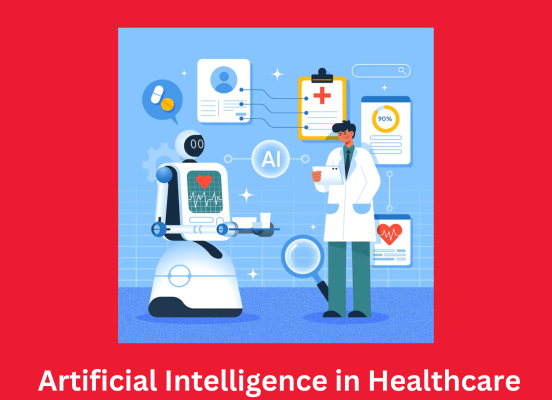
Artificial Intelligence in Healthcare: Innovations, Challenges, and Future Prospects
- By admin --
- Tuesday, 12 Mar, 2024
Artificial intelligence (AI), a disruptive force in the healthcare area, has totally modified the way that scientific records analysis, analysis, and remedy administration are done. Harnessing the potential of synthetic intelligence (AI) in healthcare holds super promise. It can do that by way of enhancing scientific imaging, powering predictive analytics, and enabling individualized remedy. This article explores the latest AI-related advances, significant roadblocks and prospects in the healthcare ecosystem so as to understand how important they are to medical administration.
1. Innovations in AI Healthcare
AI has sparked a surge of breakthroughs in plenty of healthcare domains, imparting patients, researchers, and healthcare agencies new equipment and skills. Medical imaging is one of the most promising packages of AI in healthcare. With algorithms trained on massive datasets, these structures are able to research images more correctly and efficiently than human experts. AI-powered imaging strategies and deep getting to know algorithms have proven stepped forward disease analysis and analysis for conditions starting from neurological problems to cancer, bearing in mind extra targeted treatment methods and earlier intervention.
In addition to medical imaging, AI is using improvements in predictive analytics and disorder management. Machine gaining knowledge of algorithms can analyze huge-scale affected person facts to become aware of patterns and developments which can imply disease risk or progression. By leveraging electronic fitness data, genomic statistics, and real-time tracking devices, AI systems can predict affected person outcomes, optimize treatment regimens, and even discover individuals prone to developing certain situations earlier than signs and symptoms show up.
Personalized medicine, which enables medical experts to tailor therapies for individual patients based solely on their unique genetic composition, lifestyle decisions, and medical histories, is another area where AI is making considerable progress. AI-driven decision support systems can assist physicians in selecting the most appropriate treatments and doses, reducing the risk of adverse effects and improving patient adherence to treatment regimens. Furthermore, AI-powered precision medicine has the power to transform drug research and discovery procedures, hastening the release of innovative treatments.
2. Challenges in AI Healthcare
Despite its transformative capacity, AI in healthcare isn't with out demanding situations and obstacles. One of the primary issues surrounding the adoption of AI is the moral and regulatory issues associated with using touchy patient information. In order to maintain agreement and openness in AI-driven healthcare systems, we need to ensure the privacy of individuals affected, compliance with regulations like the Health Insurance Portability and Accountability Act (HIPAA), and data security.
An further task is the "black field" problem, in which human consumers are unable to fully understand or decipher the inner workings of AI systems. Not being able to explain, there is a big chance that the safety of patients and trust of health players in decision-support systems orientated on artificial intelligence could be at risk, especially when it concerns highly risky clinical life situations. There is a reason why we seek to find ways of building AI models that are easily explainable and establish rule transparency standards.
Additionally, there are concerns about how, if used carelessly, AI might increase prejudices and healthcare inequities. Inequities in healthcare delivery can be caused by biases in educational records or algorithmic decision-making processes, which disproportionately affect vulnerable people and exacerbate already-existing gaps in access to high-quality treatment. Addressing those biases requires cautious attention of records collection practices, set of rules design, and model evaluation methodologies to make sure fairness and fairness in AI healthcare systems.
3. Future Prospects of AI Healthcare
Looking ahead, artificial intelligence (AI) in healthcare has enormous potential to improve patient outcomes and change the way treatment is delivered. AI technology advancements are expected to drive innovation in a wide variety of services, from diagnosis and treatment planning to remote monitoring and chronic illness management. This is due in part to the growing accessibility of medical information.
Furthermore, the integration of AI with other cutting-edge technologies like wearables, robots, and genomics is set to open up new avenues for proactive, tailored healthcare. AI like text that can be converted to human like text is, By utilizing AI, healthcare organizations are able to analyze multi-dimensional and multi-typed data streams and produce instantaneous observations. Health outcome of society across the globe will eventually elevate leading to an appropriate life that satisfies the entire humankind.
However, realizing the total potential of AI in healthcare would require concerted efforts to cope with the aforementioned demanding situations and obstacles to adoption. Collaborative partnerships between healthcare providers, technology builders, policymakers, and affected person advocacy corporations may be critical to navigate the complex ethical, regulatory, and societal implications of AI-driven healthcare solutions.
Conclusion:
The capacity of artificial intelligence in changing health carrier transport and improving affected person consequences is widespread. We wish to take gain of it for developing a health care device that is fairer, greater predictive, and adaptive to each individual’s wishes via careful attention, nurturing innovation, and collaborative action.





